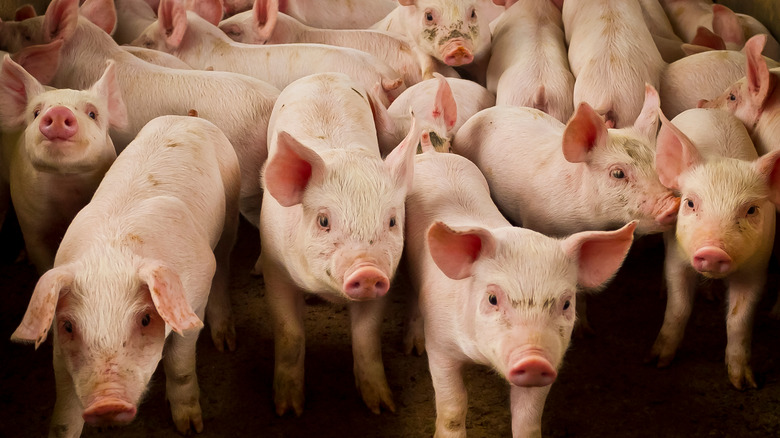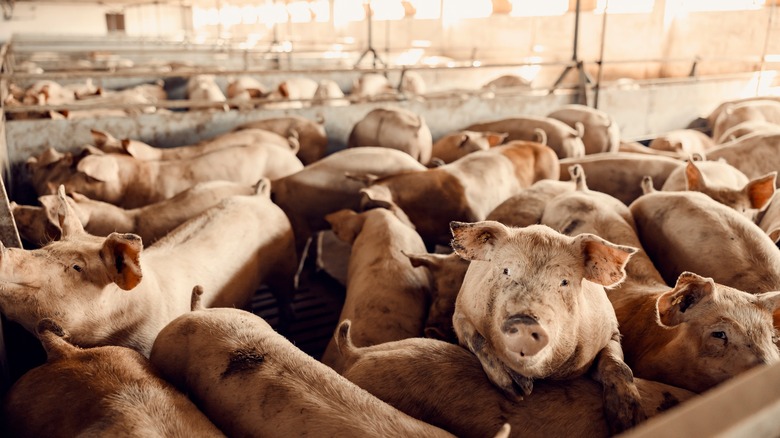Why California's Pork Ban Is Being Challenged In The Supreme Court
The U.S. Supreme Court agreed Monday, March 28 to hear an appeal from a group of pork producers challenging California's new regulations regarding the sale of pork (via NBC News). Proposition 12, which passed as a ballot initiative in 2018, sets new spatial requirements for pigs. The measure was designed to improve animal welfare, but meat producers argue that the rules are prohibitively costly.
The new law, which took effect on January 1, prohibits the sale of pork from pigs which were born to sows in pens with less than 24 square feet of living space, along with similar requirements for egg-laying hens and calves being raised for veal. The Associated Press noted that while egg and veal producers felt mostly unburdened by the requirements, as of July 2021 only 4% of pork farms in the U.S. complied with the new rule. Additionally, Reuters explains that while California is responsible for about 15% of pork consumption in the U.S., 87% of that pork comes from outside the state.
This interstate commerce issue is where the lawsuit has arisen, reports the Los Angeles Times. The National Pork Producers Council and the American Farm Bureau Federation have brought the case to court, claiming that the law violates the constitutional provision that the federal government is in charge of regulating interstate commerce, not individual states. The argument was rejected by both a U.S. District Court judge in San Diego and the 9th Circuit Court of Appeals in 2021.
Opponents are concerned with cost
If the law goes into effect, pork producers who do not meet the standards set by California would be unable to sell their product in the state, leading some experts and California business owners to worry about shortages and an increase in prices, according to the Associated Press.
Some pork producers argue that even if they do comply, it will still cause prices to rise. NBC News reports the producers' appeal argues the law will require significant changes to hog farms nationwide, with farmers either building new facilities or reducing herd sizes. The Associated Press spoke with a farmer in Iowa (one of nation's leading pork-producing states) who claims the necessary modifications would cost his farm $3 million and force him to house 50 less pigs in the same amount of space. That same farmer wrote in an op-ed for Palm Springs' Desert Sun he feels "compelling hog farmers to convert barns would drive many to close, meaning higher prices, less demand, and fewer hogs."
These concerns — which one organization estimates could temporarily increase the cost of a pound of bacon by $3.60 — come amidst continued inflation and rising food prices due to pandemic-related supply chain issues, and the threat of further increased prices due to the ongoing war in Ukraine.
Heading to court
While the law took effect on January 1, there has been little impact so far. In a small victory for pork producers and concerned retailers, Reuters reports that a California Superior Court Judge ruled in late January that sellers would not be subject to enforcement of the ban for six months after the official rules are set by the state, giving them some time to adjust.
In addition to the lawsuit, the Associated Press wrote in July 2021 that the National Pork Producers Council requested federal aid from the U.S. Department of Agriculture to help farms make modifications to meet the new standards. At the time, most farms were waiting to taken action until official regulations were finalized.
NBC News shares proponents of the California law, which passed with 63% of the vote, say it will put an end to "cruel and unsanitary conditions that threaten the health of California consumers."
A date has yet to be set for the Supreme Court hearing on the case.


